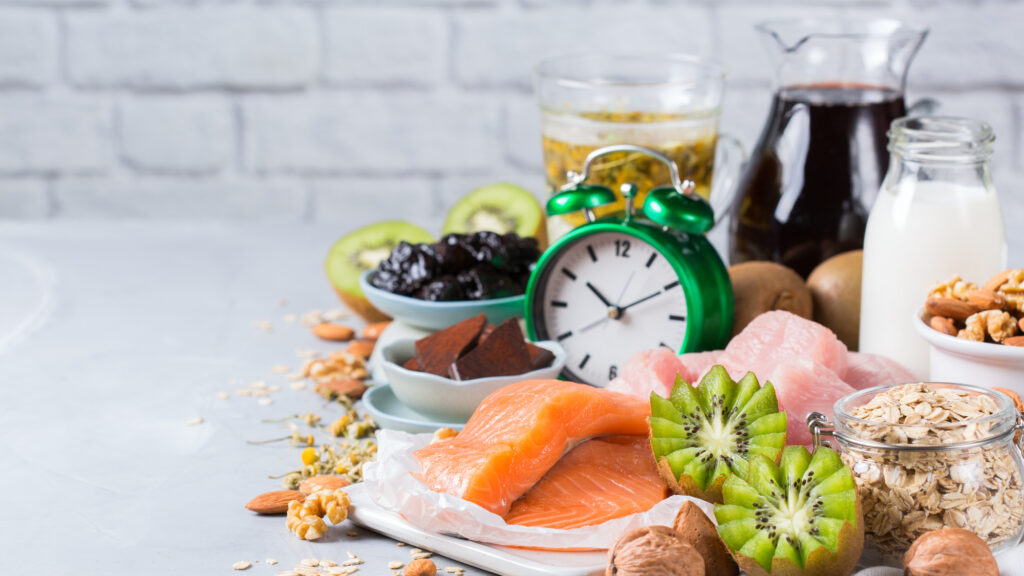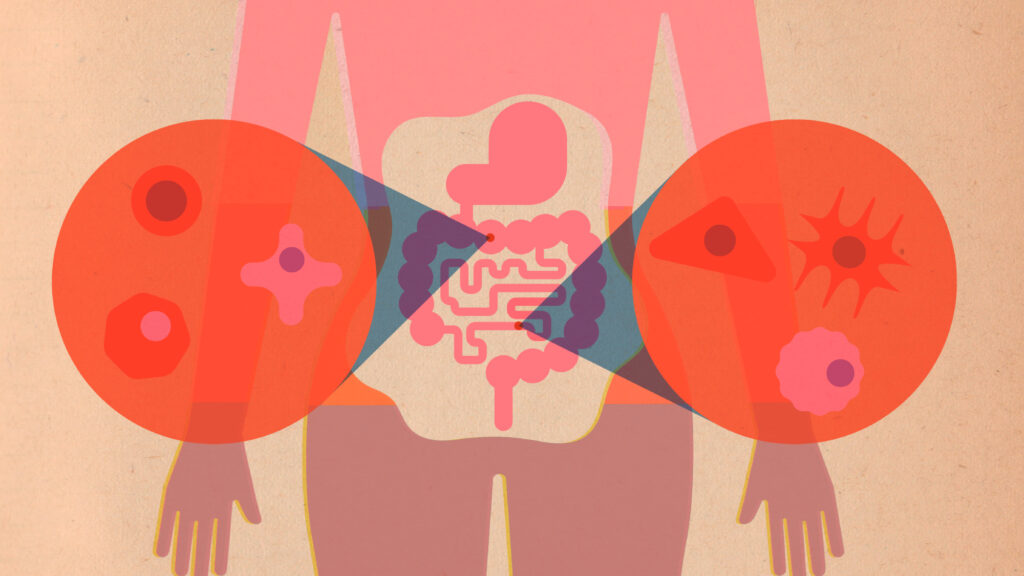
7 foods to help you sleep
Ruth Tierney
Feeling tired? We find out whether your gut health is linked to your energy levels – and what to eat to boost them both.
Your mood, sleep quality, immunity and brain health are all affected by your gut health, according to scientific research. But does gut health affect energy? Some early research suggests our gut may have a role in this.
There is also an emerging link between chronic fatigue syndrome (CFS) and gut health. A recent study, published in Cell Host & Microbe journal, showed people with CFS have differences in the diversity of their gut microbiome – the trillions of microorganisms that live in your digestive tract – compared to those without CFS. In fact, those with the condition appear to have lower levels of several specific species of gut bacteria that play an important role in maintaining gut health.
If you’ve been feeling sluggish, or if you suffer from CFS or long Covid (which is associated with fatigue), there are ways to improve your gut health and boost your energy.
Your mood, sleep quality, immunity and brain health are all affected by your gut health, according to scientific research. But does gut health affect energy? Some early research suggests our gut may have a role in this.
There is also an emerging link between chronic fatigue syndrome (CFS) and gut health. A recent study, published in Cell Host & Microbe journal, showed people with CFS have differences in the diversity of their gut microbiome – the trillions of microorganisms that live in your digestive tract – compared to those without CFS. In fact, those with the condition appear to have lower levels of several specific species of gut bacteria that play an important role in maintaining gut health.
If you’ve been feeling sluggish, or if you suffer from CFS or long Covid (which is associated with fatigue), there are ways to improve your gut health and boost your energy.
 Credit: Shutterstock/Nata Bene
Credit: Shutterstock/Nata BeneLucy Kerrison, gut specialist registered dietitian at The Gut Health Clinic, says: “Improving your gut bacteria can help with energy levels as well as processes related to hormones and B vitamins, which are connected to your energy levels, too.”
Lauren Windas, a nutritionist specialising in gut health and fatigue, who has also suffered with irritable bowel syndrome (IBS) and CFS, has experienced first-hand the links between her gut, diet, lifestyle, mindset and symptoms. Windas has recently published a book, Chronic Fatigue Syndrome: Your Route to Recovery, detailing her journey to help others.
She says that studies have found that the mitochondria – structures found in cells within the body that convert food into energy – are not functioning or producing energy correctly in people with CFS.
In terms of diversity in the gut microbiome, she says: “It makes sense that what you’re eating is going to feed your gut bacteria, for the better or worse.” However, she explains that many people with CFS are sensitive to certain foods, which can trigger a flareup of their condition. This suggests gut problems and fatigue are connected.
What is CFS, and what is long Covid?
 Credit: Shutterstock/margouillat photo
Credit: Shutterstock/margouillat photoKerrison says vitamin D is linked to your energy levels. It works by aiding the function of the mitochondria and, in turn, increasing your energy. The body produces vitamin D through exposure to direct sunlight. Dietary supplements are another source of vitamin D.
She adds: “You can get small amounts from foods like oily fish, including salmon, sardines and mackerel, egg [yolks], and mushrooms that have been left in the sun [to raise their vitamin D levels].” Mushrooms enriched with vitamin D are available to buy. Red meat and liver are also sources and some foods, including breakfast cereals, plant milks and fat spreads, are fortified with the vitamin.
Much like vitamin D, vitamin B12 and folate can prevent fatigue. “They help to create red blood cells, which are essential for transporting energy around your body,” explains Kerrison. “If you’re not getting enough vitamin B12 [or folate], you might feel really tired.”
Vitamin B12 is found in animal-based foods like meat, fish, eggs and dairy products as well as yeast extract (such as Marmite), and fortified foods, such as breakfast cereals.
“If you’re following a vegan diet, taking a B12 supplement can help you to get enough,” she says.
Meanwhile, good sources of folate include leafy green vegetables like cabbage, kale and spinach, broccoli, and Brussels sprouts. Other good sources are peas, chickpeas and kidney beans, and breakfast cereals fortified with folic acid.
She adds: “If you’re eating a variety of colourful plant-based products, then you’re likely to be getting enough folate.”
“Again, iron is essential for red blood cell formation and delivering energy around your body,” explains Kerrison. The NHS states adults need 8.7mg of iron per day. However, women aged over 50 who are still menstruating may need 14.8mg per day – the same amount of iron as women aged 19 to 49.
“There are two different types of iron,” says Kerrison. “Heme iron, which is from animal products, and is quite easy to absorb. It’s found in foods like red meats, oily fish and poultry.” Bear in mind, eating too much red meat can be bad for your health.
Non-heme iron is found in plant-based foods, such as “dried fruits, pulses and in some leafy greens,” she says, adding that this type is “much harder to absorb. Improve your absorption by having a food high in vitamin C at the same time, such as a glass of orange juice or some lemon.”
“Foods with a high fibre content provide a slow release of energy, which is beneficial for improving energy levels,” says Kerrison. “A higher fibre diet is linked with a reduction in several different chronic conditions,” she adds. According to the NHS, we should aim for 30g of fibre per day, yet many of us are only eating around 20g.
Foods containing fibre include:
All fats are high in energy and a small amount is an essential part of healthy eating. But any fat that’s not used by your body’s cells or turned into energy is converted into body fat, which can raise your cholesterol and increase your risk of heart disease. Replacing saturated fats with some unsaturated fats can help to lower your cholesterol level.
Unsaturated fats include omega-3 fatty acids found in oily fish, which Kerrison says are “really well-tolerated prebiotics, which can improve your gut bacteria”. Other examples include plant-based sources, such as olive oil, rapeseed oil, avocado, and some nuts like almonds, brazils and peanuts.
Saturated fats are found in animal products such as sausages, butter, ghee, and cheese; and chocolate confectionery, biscuits, cakes and pastries; as well as in plant-based foods like coconut oil.
Kerrison’s top tip: energy is not just about your diet. It’s important to look at what you eat, but also to take a holistic approach and look at your sleep and overall lifestyle and health.
 Credit: Shutterstock/ratmaner
Credit: Shutterstock/ratmanerKerrison says: “There are four main nutrients that are linked to energy levels. These are B12, folate, iron and vitamin D. You need to make sure that you’re not deficient in any of these.” Fatigue and lack of energy are symptoms that could mean you are deficient in one or more of these nutrients.
As the body creates vitamin D from direct sunlight on the skin when outdoors, we do not make enough of it from the sun in winter – so the Government recommends everyone in the UK should consider taking a vitamin D supplement from around October to early March. Supplements are available in spray form, which Kerrison explains is well absorbed, or in tablet form. “If you’re taking a tablet, your body might not absorb it as well, so I’d recommend eating it with a meal that’s got some healthy fats in it. This will help you absorb it.”
She also has a simple way for being able to tell if you’ll be able to get vitamin D from the sun. “Go out into the sunlight and look at your shadow. If your shadow is shorter than you, then the sun is close enough to be penetrating your skin and creating vitamin D; if your shadow is longer than you, then the sun is too far away.”
The NHS has detailed information on signs and symptoms of vitamin deficiencies. Visit your GP if you think you might have any deficiencies, to discuss supplements that may help or ways that you can boost your intake through diet.
You might be wondering what plants have got to do with energy. It’s to do with how they influence our gut bacteria when we eat them.
“If you have poor energy levels, working on improving the diversity of your gut bacteria could be really key,” says Kerrison. She adds that this is important as you age, especially for women going through the menopause, as evidence shows your gut microbe diversity decreases.
She continues that the way to improve this is by eating a range of different plant foods. A large-scale study called the American Gut Project, which took stool samples from more than 10,000 people, found that people who ate 30 different plant-based foods each week had more diverse gut bacteria compared with those who ate fewer.
Kerrison says it’s important to eat a variety of different “whole-grains, fruits, vegetables, beans and pulses, and nuts and seeds” each week.
 Credit: Shutterstock/marilyn barbone
Credit: Shutterstock/marilyn barboneMaking sure you are eating an appropriate amount of the different food groups to maintain a healthy balanced diet can help to achieve consistent energy levels.
“If you’re having white toast and honey for breakfast, for example, it’s going to give you a lot of immediate energy followed by a big slump in energy,” says Kerrison.
“You should include a small amount of healthy fats, protein and high-fibre carbohydrates, as well as some vegetables at every meal. If you have this good balance of fibres, proteins and fats, the absorption of your food is a little bit slower and, in turn, you will experience a slower release of energy, which will sustain you for longer.”
Expert bios
Lucy Kerrison is a gut specialist registered dietitian at The Gut Health Clinic. She is passionate about helping clients reduce debilitating gut symptoms and understand their gut. Kerrison specialises in the use of the low FODMAP diet in managing IBS and other conditions.
Lauren Windas is a registered and licensed nutritionist, author, naturopath, NLP practitioner and co-founder of self-care company ARDERE. She has been diagnosed with IBS and CFS, and now works with clients to help them with similar gut issues.

Written by Gemma Harris she/her
Published: Updated:
Gemma Harris has been a journalist for over seven years and is a self-confessed health and wellbeing enthusiast, which led her to specialise in health journalism. During her career, she has worked with top editors in the industry and taken on multiple high-discipline fitness challenges for certain outlets. She is particularly passionate about nutrition; after being diagnosed with irritable bowel syndrome in 2016, she discovered her fascination for gut health and founded thegutchoice.com – a dedicated space for providing a hopeful outcome for people with gut issues. Gemma’s core aim is to help others through her writing.

Ruth Tierney

Rebecca Frew

Gemma Harris

Patsy Westcott